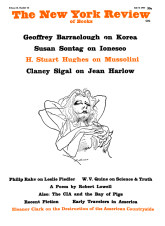In response to:
The Young Shelley from the May 28, 1964 issue
To the Editors:
I would like to thank Mr. G. M. Matthews for his most painstaking review of my edition of Shelley’s The Esdaile Notebook, and especially for the list of questioned readings which he included. He was able to compile this list—as may not have been clear to your readers—because he has a photoduplicate of the manuscript. (He is, I understand, editing the poems for another publisher.) He also implies that he has worked with a transcript of the second part of the notebook made by Edward Dowden. Presumably he has, with these aids, made his own transcript, and it is with this that he has compared the printed text (apparently line by line). As a result of this industry, Matthews has turned up a number of errors in the text (mostly in the second part), and these will be gratefully incorporated in further editions. “On” will become “in,” “where” will become “when,” “meteor” will become “meteors.” (“flaming deep,” however, will not become “flaming sleep”; nor will “dear mother’s gore” become “dead mother’s gore”). All one can say of such errors is that no transcriber is infallible and that all one can hope for is to keep errors to a minimum, not, alas, to eliminate them. It is also an advantage to come second.
A more serious matter, as Matthews states, is that in “The Retrospect” (not “The Retrospect. Cwm Elan” as he has it; Cwm Elan is the place where the poem was written, not part of the title) two lines have been transposed. How this happened I do not know. The lines were in correct order in the page proof. Presumably some accident happened to the type during the final stage of book production.
Matthews is less happy in his comments on textual editing than on matters of transcription. For instance he objects to the comma which I have inserted after “so” in the following lines:
Dear girl! thou art wildered by
madess,
Yet do not look so, sweet.
The comma, however, is clearly needed. As the poet envisages the mad girl he says, in effect: “Do not, sweet one, look at me in that wild way.” “Do not look so sweet,” is a ridiculous and curiously obtuse reading. In regard to such changes, moreover, two points should be noted. First, Shelley himself put in very little punctuation and if one is to prepare a generally readable text it is necessary to supply some. Second, I have not made the addition silently. It is recorded (as are similar changes) in the textual notes.
Kenneth Neill Cameron
The Carl H. Pforzheimer Library
New York City
G. M Matthews replies:
I am very glad that some of my guesses will be useful for later editions of The Esdaile Notebook (and may these be numerous), but I must hasten to assure Professor Cameron and your readers that I have never seen the manuscript or a photocopy of it beyond the facsimiles given in the auction catalogue and in the book I was reviewing. Nor have I any concern whatever with any other separate edition of these poems. The readings I queried were all conjectural probabilities, some supported by Part II of Dowden’s transcript and some by experience of Shelley’s other verse manuscripts. I didn’t therefore expect all of them to score hits, and shall be most interested to learn which of them did so.
It is cordially agreed that the poems needed punctuation, and I was not necessarily objecting to an editorial comma before sweet in the lines
Dear girl! thou art wildered by madness Yet do not look so, sweet.
The comma was not, however, essential, as the lines make sense as they stand in the manuscript. Without her comma, the dear girl is wildered but looks sweet to the poet; with it, she is wildered and looks it, and the poet wishes she didn’t. Whereas in the line “And virtue forbids, tho’ I languish to die,” an editorial comma after languish seems essential to any meaning but was not supplied. This (it seemed to me) showed some inconsistency in the degree of editorial interference with the text.
I am sorry that Professor Cameron has said nothing to allay the suspicion that over-haste to forestall the Oxford edition has caused errors in his otherwise admirable book. The transposed lines were not my only evidence for this: as a further example, an important word has been missed out of the poem “Passion,” at the top of page 42.
This Issue
July 9, 1964



